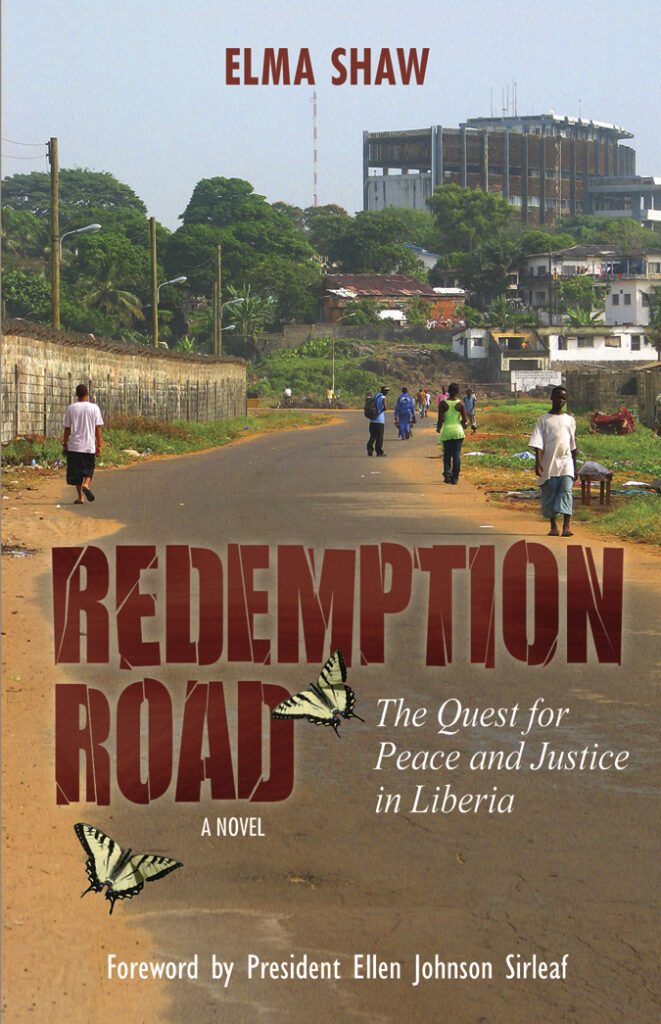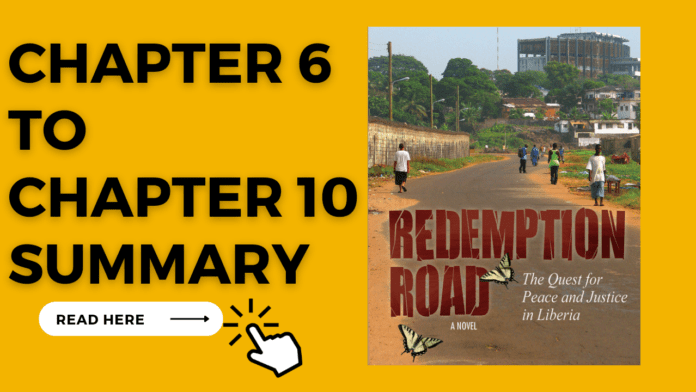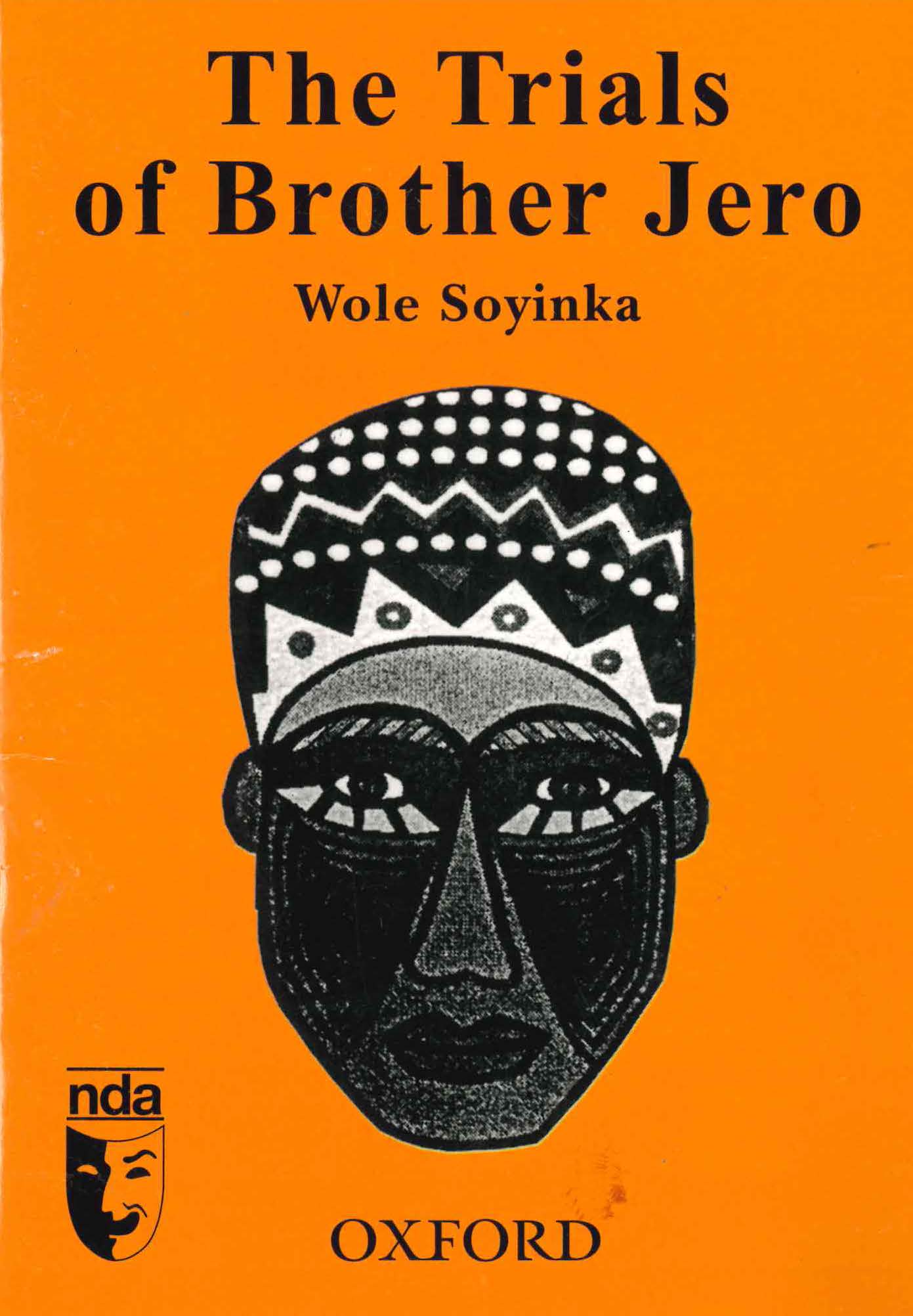📚 Need a custom study guide on any literary text? Get the best study guide money can buy from us at Literature PADI! Detailed, insightful, and crafted by literature experts to give you maximum value for your money.
[See Pricing & Details!]
In this post, we are going to summarise Elma Shaw’s Liberian post-war novel, Redemption Road, from chapters six to ten.
Chapter 6 Summary
The following day when Agnes comes for Bendu, she answers the door, dressed and smiling. She has resolved to prosecute Commander Cobra for what he did to her, and his other war crimes. Agnes tries to warn her that it might be impossible, but she insists.
The two women ride together in a chartered taxi to Peace in Practice. Before they open the office door, Agnes tells Bendu that she has informed Calvin and Siatta about Bendu’s encounter with Cobra and they are already waiting to help. This does not go well with Bendu. Her sister, Siatta, becomes annoyed with Bendu’s response and expresses a desire to leave. Calvin intervenes to calm Siatta down and tells her that Bendu needs her family around her right now, even if she doesn’t want to admit it.
They convene in Bendu’s office where Calvin questions Bendu about Commander Cobra. Bendu admits to being too afraid of Cobra to gather any information about the details of his car. Calvin suggests arranging security for Bendu’s protection.
Bendu tells them of her plan to find Cobra and bring him to justice. Again, Agnes expresses her doubt about the feasibility of Bendu’s plan. But Siatta supports her sister’s decision. She wonders why Sierra Leoneans “sat there and let illiterate ragtag hoodlums, fighters, and children rob, rape and kill” them for so many years (p. 39). Agnes snaps at her that she ran away to America and did not have a firsthand experience of what happened during the war; so, she will never understand. Siatta claims that she would never have allowed anyone to take her dignity or life. But Agnes dismisses her with the claim that she “had absolutely no idea what it was like” (p. 39). Calvin cuts into the argument to prevent it from escalating. He talks about how Bendu needs security at that point because they cannot tell what action Cobra might take if he discovers that Bendu is looking for him.
(Siatta would change her views about those that stayed behind and witnessed the war after her firsthand experience of the intense fighting in Gardnersville in Chapter 32 of Redemption Road.)
Siatta suggests they hire an artist to draw Cobra’s picture to make a WANTED poster. But Calvin dismisses the idea and promises to find him. He hopes Cobra doesn’t try anything stupid or he would have him to answer to. His position is not unconnected with Benji’s death and his traumatic experience watching his dear friend killed by army guys in 1980. He now sees in every soldier Benji’s killer. He is determined not to let history repeat itself. Agnes expresses concern over Calvin’s motivations and warns him to be careful in his quest for revenge.

Chapter 7 Summary
In Chapter 7 of Redemption Road, the narrative shifts to Moses Varney, formerly Commander Cobra. Moses Varney visits the Judiciary chambers for the second time that week. He is welcomed by Judge Dagoseh. He describes the judge as “the most corrupt character in the justice department” (p. 42) but the only one willing to help Varney’s cause.
Moses Varney sees Judge Dagoseh as a symbol of Liberia’s problems, especially with how he uses the power he wields in the courthouse to collect bribes to liberate himself from poverty. Varney bribes the judge who in turn hands him a manilla envelope as he leaves. The encounter between the two characters is purely transactional, which is why Varney is annoyed by the judge’s statement of being “glad to be part of the revolution” (p. 44) after receiving a bribe to that effect.
Another takeaway from this meeting between Varney and Dagoseh is that an impending revolution is implied that would lead to a change of government. The both characters are helping the revolution come to reality. They also have different perspectives about the coming revolution. For Dagoseh, it is a means for his “liberation from poverty” (p. 43) as evident in his collection of bribes to make it happen. For Varney, it is a means of “liberation of the people from tyranny” (p. 43).
Chapter 8 Summary
The search for Commander Cobra has begun. Calvin searches for Commander Cobra at hotels, bars, and nightclubs. Terrance refuses to help find Cobra with his political connections, when asked by his wife, Siatta.
Bendu receives support from Siatta and Agnes as she resumes her normal activities. She, however, keeps having recurring nightmares, chief among which is her failed attempt to escape Duluma camp. She always wakes up before she has to face Cobra and Samson in the nightmare.
A week after her encounter with Cobra, Bendu and Siatta visit Calvin at his Congo Town home. Calvin, Bendu, and Siatta discuss various topics, including war stories and missing people. They talk particularly about “a whole football team they used to sponsor” (p. 46) that went missing. Siatta is optimistic that they will be found but Calvin says it is highly unlikely. He goes on to talk about how the war worked:
“Boys and men were often killed systematically. No warring faction wore uniforms so you didn’t know whose side anyone was on. Every faction feared men that they didn’t know.”
(p. 47, Redemption Road)
Calvin expresses his indifference to the war stories and says that he doesn’t feel any sympathy towards “those people” who suffered displacement and starvation during the war. “Those people” in this context refer to the indigenous Liberians. There have always been ethnic tensions between indigenous Liberians and Americo-Liberians.
Bendu tries to make Calvin see that “those people” are victims of the war, especially the women and children. But Calvin dismisses her claim with the fact that women and children did the most ignominious things during the war in order to survive; that the “most vicious killers during the war were women” (p. 48) and children.
From the turn of their conversations, it is apparent that Calvin is still embittered by what the indigenous Liberians did to them during the 1980 coup; how their grandparents and parents killed President Tolbert and his cabinet ministers; how they witch-hunted and tortured Americo-Liberians; and how, like in the case of Benji, they killed Americo-Liberians. While Bendu is shocked that Calvin could be so cold-hearted, Calvin remains unsympathetic towards whatever happened to the native people. He believes they deserved everything that came their way during the civil war. He sees it as them reaping what their forebears did to the Congo people in 1980. However, Siatta thinks differently. She has done nothing wrong and believes “no individual should be punished for the sins of their ancestors” (p. 50).
Back in her house in the evening, Bendu tries to imbibe Siatta’s philosophy but realises that she is fooling herself, considering what she did and was done to her during the war which her family and friends are still unaware of.
Chapter 9 to 10 Summaries
Chapter 9 and 10 summaries of Redemption Road can be found in our study guide. You can proceed to our store to buy Study Guide: Redemption Road by Elma Shaw.
Premium PDF
There are 862 words left in this article and a total of 26,272 words in our premium PDF. Download the entire Redemption Road study guide as a printable PDF now!

Other Chapters:
- Chapter 1 to 5 Summary of Elma Shaw’s Redemption Road
- Chapter 11 to 15 Summary of Elma Shaw’s Redemption Road
- Chapter 16 to 18 Summary of Elma Shaw’s Redemption Road
- Chapter 19 to 26 Summary of Elma Shaw’s Redemption Road
- Chapter 27 to 34 Summary of Elma Shaw’s Redemption Road
Further Reading:
- Characters in Elma Shaw’s Redemption Road
- Plot Summary of Elma Shaw’s Redemption Road
- Themes in Elma Shaw’s Redemption Road
Join Our Social Media Channels:
- WhatsApp: Literature PADI
- Telegram: Literature PADI
- YouTube: @literaturepadi
- Facebook: Literature PADI
We also have two WhatsApp chatrooms with a little above 1,300 like-minded members. You can join any of them for further literary discussions:
Ensure you join one at a time to allow others to be part of our wonderful community.













